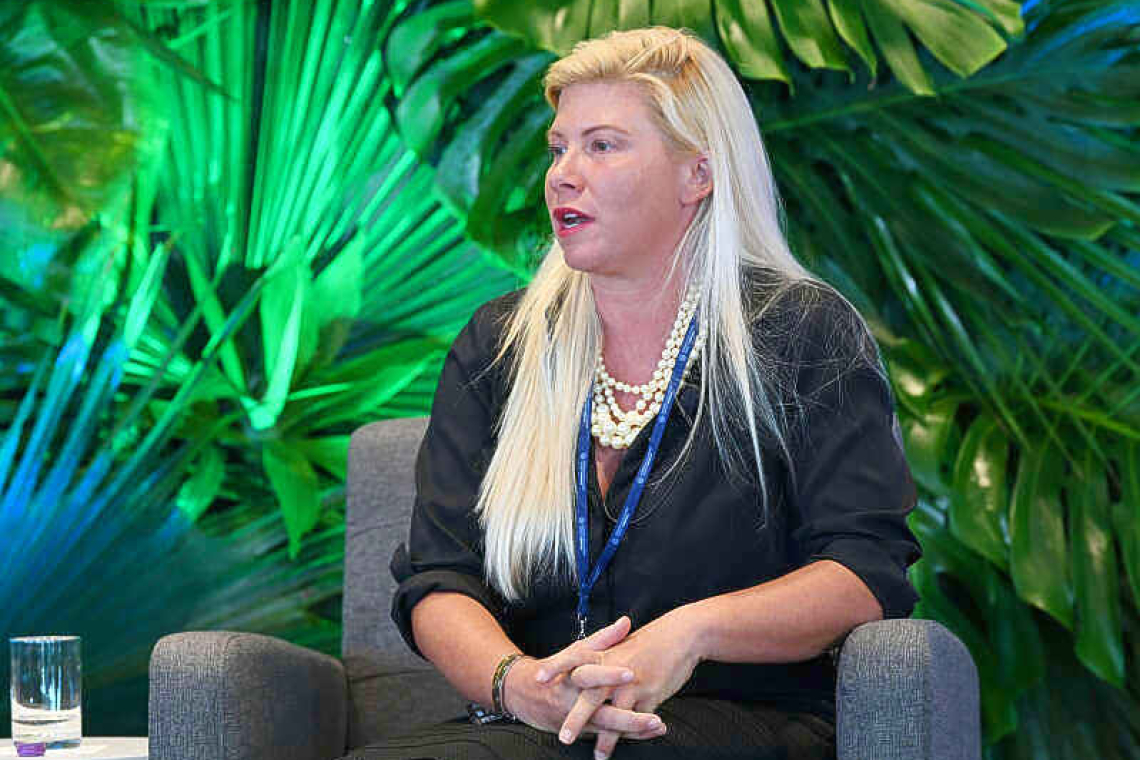Lindsay Watson appearing on a panel at the Bermuda Climate Summit, Monday. Photo credit Akil Simmons.
HAMILTON, Bermuda--Data gleaned from a pioneering coral reef project in Bermuda could benefit insurers as well as storm-vulnerable people worldwide, a panellist at the second annual Bermuda Climate Summit said on Monday.
Lindsay Watson, retired from a career in the re/insurance industry, is the director of risk mitigation and industry solutions at the island-based Living Reefs Foundation.
She appeared on the panel “Global Climate Risk” on the first day of the two-day conference.
Living Reefs is partnering with the government’s Works and Engineering Department on an underwater 3D-mapping project known as photogrammetry, in two areas of particular vulnerability at the causeway in Hamilton Parish.
Watson said that the pilot project will strategically plant corals in two sites at the east and west end of the causeway that are particularly in need of protection in order to increase protection and reduce the potential “damageability” of storms.
During the panel discussion, Watson said coral reefs dissipate the impact of waves during a storm by 85%.
Later, she explained: “The flood and wave impact would turn from what we would typically see as a Category 1 [hurricane – Ed.] into the ‘damageability’ of a Category 4 without the protection of the coral reefs.”
Of such nature-based solutions, Watson said: “That money spent now is much more efficient use of capital versus post-loss spending.”
Dr. Samia Sarkis, founder and executive director of Living Reefs, said surveys before and after the project will help to determine and quantify the impact made by planting the corals and strengthening the existing coral reef barrier along the causeway.
Watson said: “Using this as a pilot programme, it then can be utilised again, whether it is throughout Bermuda or throughout the world, using these techniques.”
Dr. Sarkis said insurance industry giants Swiss Re and Willis Towers Watson are two examples of companies that are breaking new ground.
Of the Swiss Re product, Dr. Sarkis said: “Swiss Re put a premium on property insurance, and so when there is a storm and when there is a need for coral restoration, then that premium goes directly back to coral restoration.”
She said she would love to see a model like that for Bermuda.
Restoring damaged reefs, Dr. Sarkis said, can be done only with the partnership of the private sector and the support of government.
Watson and Dr. Sarkis said the project can assist re/insurance companies by providing new data to help them to develop better coral models to use in product development. Examples might include property and business interruption.
Dr. Sarkis said: “That product will be tailored to going back and restoring the reef so that properties and communities can keep going.”
Funding for the first year of the Living Reefs project has been provided by a British Overseas Territories organisation, but ideally data would be collected over at least a three-year period, Dr. Sarkis said. ~ The Royal Gazette ~







